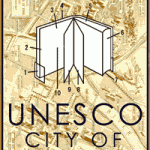It’s that time when the national press gathers in Iowa. Their early primaries attract politicians who set up tents, give speeches beside bales of hay and American flags, barbeque meat (and one another), and hand out flyers, home-made preserves and lots and lots of opinions.
In spite of, or perhaps because of, the national media coverage, people who live somewhere other than the Midwest still harbor major misconceptions about the folks that live there. In the interest of telling some of the rest of the story, I’d like to introduce you to “my Iowa.”
 During each of the last four summers I’ve spent a week or more in Iowa City at a writer’s festival. My experience hasn’t matched the media focus on farms, family, and folklore that appear on the nation’s front pages. I’m not saying that Iowa doesn’t have corn and soybean fields, and cows, tractors, and farm subsidies. But there’s a lot more to the Iowa story.
During each of the last four summers I’ve spent a week or more in Iowa City at a writer’s festival. My experience hasn’t matched the media focus on farms, family, and folklore that appear on the nation’s front pages. I’m not saying that Iowa doesn’t have corn and soybean fields, and cows, tractors, and farm subsidies. But there’s a lot more to the Iowa story.
I used to live in a neighboring state, Nebraska, and what I knew from that experience in the 70’s was that Iowa had more women school superintendents and principals than any other state in the union. Also, Iowa women dominated women’s basketball and played to sell out crowds. This was at a time when it was thought, in other parts of the country, that girls weren’t interested in sports, and that there wouldn’t be an audience for their games if they did play. My friend Rose and I always thought these two facts were connected – women leaders in education and women basketball players. Didn’t seem much of a stretch to us. Iowa girls grew up as team players believing they could compete and win, all the while being supported by their communities.
According to a gay man who operates a bed and breakfast where I’ve stayed in Iowa City, there’s a strong tradition of human rights in Iowa. The year that Iowa became one of the few states where gays and lesbians could marry, he told me, “It’s not about how people feel about gays and lesbians. It’s about how they don’t think the government should be in the business of telling folks whom they can and cannot marry.”
The streets of Iowa City are paved with gold, (or maybe it’s brass.) Like the stars on the sidewalks of Hollywood, commemorating people in the entertainment field, Iowa City sidewalks contain glistening golden plaques commemorating literary figures like Raymond Carver, Flannery O’Connor, Tennessee Williams, and Kurt Vonnegut. The Iowa Writers’ Workshop pioneered the teaching of creative writing at the university level 75 years ago, and these writers and many others were teachers or students there. 2011 is also the 25th anniversary of the Summer Writers’ Festival. People from all over the country assemble in Iowa City to teach, write, and pursue literary projects. They receive the hospitality of a community who cares about all this literary activity and are proud that their city has been declared by UNESCO one of two Cities of Literature in its Creative Cities Network.


